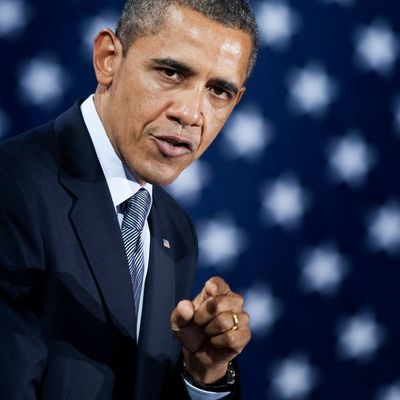
One of the problems afflicting President Obama’s campaign at this early date is that people don’t know what his campaign theme is. Edward Luce today argues that Obama has failed to explain what he has done or what he would do in a second term. Paul Krugman jumps in and adds that Obama has failed to provide the rationale for its economic management:
>Obama defenders do in fact have a clear story, which goes like this: he was confronted both with a very bad economy and with complete political obstruction — which mattered, by the way, even when Democrats controlled both houses of Congress, because of the filibuster. So he did what he could, via stimulus and other policies, and pulled the economy back from the brink. If he hasn’t done more, well, maybe he could have gotten a somewhat bigger stimulus, maybe he could have done more on housing relief, but on the whole he did pretty well given the political environment. …
… this is not the story the administration has been telling, at any point.
I think Krugman’s account of Obama’s behavior is analytically correct. But I see no evidence to believe that this is a good campaign theme for Obama. The brutal fact is that people don’t agree with Keynesian economics, at least not in the abstract. Most Americans have a gut-level belief that an economic crisis means the government should reduce its deficits, not increase them. Nor do I see much evidence that it’s possible for a president to disabuse them of this belief.
At the same time, I should note, Obama does have a campaign theme.
I think Krugman’s account of Obama’s behavior is analytically correct. But I see no evidence to believe that this is a good campaign theme for Obama. The brutal fact is that people don’t agree with Keynesian economics, at least not in the abstract. Most Americans have a gut-level belief that an economic crisis means the government should reduce its deficits, not increase them. Nor do I see much evidence that it’s possible for a president to disabuse them of this belief.
At the same time, I should note, Obama does have a campaign theme.
The fact that high-information voters like Edward Luce and Paul Krugman seem unaware of it suggests that Obama might need to hit the theme a little harder. But the theme is “We Can’t Wait.” Charlie Savage reports that Obama actually came up with the slogan himself in a staff meeting. The idea is that Republicans are blocking any action to help bolster the economy, and so Obama is going ahead himself, either taking whatever unilateral actions are available, or demanding that Congress act (and thereby exposing them to blame when they inevitably refuse).
Obama has been rolling out pieces of the “We Can’t Wait” agenda for several months now. Today, he’s demanding Congress acts to keep student loans from rising. He met with success with his campaign to extend the payroll-tax holiday and some of the unilateral parts, like his recess appointment of Richard Cordray to the Consumer Financial Protection Bureau. The list of items on Obama’s “We Can’t Wait” agenda is pretty long. Many of the items amount to Keynesian stimulus spending, but defining these proposals in specific terms — infrastructure spending, hiring back laid-off teachers and cops — frees them from the general animus against spending.
Most of the proposals have simply gone nowhere. I don’t think Obama regards that as a big problem. Verifiable progress, and bipartisan signing ceremonies, are nice. But the essence of Obama’s theme has been to detach himself from the wildly unpopular Congress. “We Can’t Wait” is a way of highlighting the fact that Obama wants to pass laws that Congress won’t pass.
The Republican polling firm Resurgent Republic published an interesting report of several focus groups with Latino voters. The report underscores just why Obama wants to drive home this theme. Obama’s vulnerability is that he hasn’t passed some of his proposed agenda, because Republicans succeeded in blocking it with the filibuster:
A majority of respondents cite Obama’s “weak leadership” and political naiveté as weaknesses that have limited his ability to get the country on the right track. There’s a sense that the President is not strong enough in dealing with Congress, which contributes to his inability to “make things happen.” Compared to the non-Hispanic focus groups we’ve conducted, this leadership critique is more prevalent among Hispanic voters since immigration reform is still pending. Some even suggest Obama can be “wish-washy.”
The focus groups consist of Latino voters, but, as it notes, they simply express somewhat more strongly a common strain of disappointment in Obama. The strategic ground of the election, at least as far as defining Obama, is in allocating the blame for legislative gridlock. Republicans want their ability to block Obama’s agenda to reflect badly on him. He wants it to reflect badly on the Republicans.






























